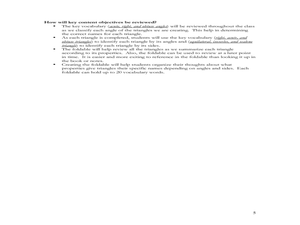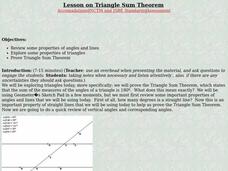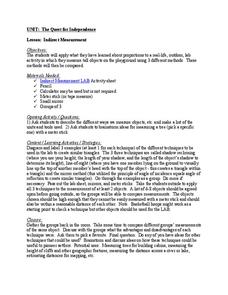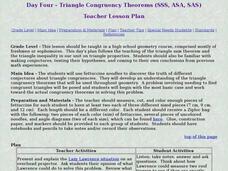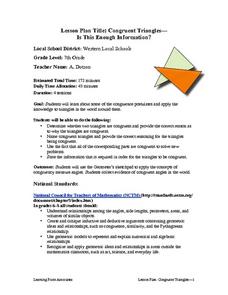Curated OER
Triangle Conjectures
Tenth graders investigate the theorems of ASA, AAS, AAA and ASA. In this geometry instructional activity, 10th graders discuss the theorems of triangles and how it is used to solve for missing sides or angles. They review how two angles...
Key Curriculum Press
Triangle Inequalities
Properties about triangles are explored in this lesson. Geometers make conjectures about the length of a triangle's sides, the length of the angles in relation to the length of the sides, and the measure of the exterior angles of a...
Curated OER
Angles in Triangles
Eighth graders translate word problems using mathematical ideas. In this geometry lesson, 8th graders identify angles of triangles using equations and the triangle sum theorem. They create angles with a protractor and straight edge.
Curated OER
Triangle Sum Theorem
Tenth graders investigate the theorems of angles and lines to prove triagle sum theorem. In this geometry lesson, 10th graders discuss the theorems of triangles and how it is used to solve for missing sides or angles. They review how two...
Curated OER
Indirect Measurement
Learners measure and apply their knowledge of proportion to solve problems. In this geometry lesson, students measure using a meter stick, small mirror and measuring tape. They compare and contrast their measurements to objects outside...
Curated OER
Triangles Congruency Theorems
Tenth graders investigate the theorems of ASA, AAS, AAA and ASA. In this geometry lesson, 10th graders discuss the theorems of triangles and how it is used to solve for missing sides or angles. They review how two angles are formed by...
Curated OER
IGD: Perpendicular Bisector
Students draw perpendicular bisectors. In this perpendicular bisectors lesson, students identify the perpendicular bisector in a polygon. They use web tools to create and measure perpendicular bisectors. Students...
Alabama Learning Exchange
Is It a Triangle?
Students explore the concept of triangle inequalities. In this triangle inequality lesson, students cut spaghetti noodles into given lengths. Students use the noodles to complete a worksheet about triangle inequalities. ...
Curated OER
Triangle Explorer
Students compute the area of triangles in a computer program. In this measurement lesson plan, students complete 5 easy, 5 medium, and 5 hard problems.
Curated OER
Simply Similar at Sea: Simple Triangles
Tenth graders answer a variety of problems based on similar triangle and learn about the rule of thumb. They will test the rule of thumb by estimating the distance to an object in the classroom.
Curated OER
Congruent Triangles - Is This Enough Information?
Seventh graders examine congruence postulates and apply knowledge to triangles in the world around them.
Curated OER
Triangle Explorer
Students calculate the area of triangles using a variety of materials including computer applets.
EngageNY
Converse of the Pythagorean Theorem
Discover a new application of the Pythagorean Theorem. Learners prove and apply the converse of the Pythagorean Theorem in the 17th lesson in a 25-part series. The examples ask learners to verify right triangles using the converse...
EngageNY
Putting the Law of Cosines and the Law of Sines to Use
Use the Law of Cosines and the Law of Sines to solve problems using the sums of vectors. Pupils work on several different types of real-world problems that can be modeled using triangles with three known measurements. In the process,...
Las Cumbres Observatory
The Cosmic Distance Ladder: Parallax
Scientists don't have a ruler long enough to measure to the stars, so they rely on math. Scholars learn to calculate the distance from Earth to a star using the parallax method. They use angle measures from different perspectives to...
Illustrative Mathematics
Seven Circles III
A basic set-up leads to a surprisingly complex analysis in this variation on the question of surrounding a central circle with a ring of touching circles. Useful for putting trigonometric functions in a physical context, as well as...
Curated OER
Law of Sines
In this Law of Sines worksheet, students describe, in their own words, when to use the law of sines. They give an example of a problem using the law of sines. This two-page worksheet contains one problem and a sample answer.
Curated OER
The Trig To Soccer
Young scholars are given the background information to open the lesson: Suppose a penalty kicker in soccer could choose where he could kick from, as long as he stayed on the back line of the penalty area. Would he have a better chance of...
Curated OER
Measurement Investigations 1
Fifth graders find perimeters, areas, and volumes of everyday objects and state the precision. They work in small groups in order to take measurements, perform calculations, and write a group report about the investigation.
Curated OER
ndirect Measurement Technique: Using Trigonometric Ratios
Ninth graders find the height of an object that would be difficult or impossible to measure directly. They construct and use a Clinometer to measure the angle of elevation (or depression). Students create a sketch of the measurement...
Curated OER
Introducing Trig
Fifth graders explore the importance of triangles in the real world. They find the unknown side of a right triangle using a scale drawing. Students use Pythagoras' Theorem and other appropriate ratios.
Curated OER
Pythagorean Theorem
Students are introduced to the Pythagorean theorem. They use three different activities that give students the opportuntiy to observe triangles, and use the Pythagorean theorem and practice different ways of determining areas of...
Curated OER
Similar Triangles - Geometry Exploration
Eighth graders become engaged in a instructional activity in geometry to improve mathematical skills. They construct triangles, segments, and points using Geometer's Sketchpad to demonstrate how dilations of triangles and rectangles...
Curated OER
Lesson Exchange: Polygons (Middle, Mathematics)
Pupils discover the relationship between the sides of a polygon and the number of diagonals that can be drawn from one vertex, the number of triangles that those diagonals form, and the sum of the interior angles of that polygon.


